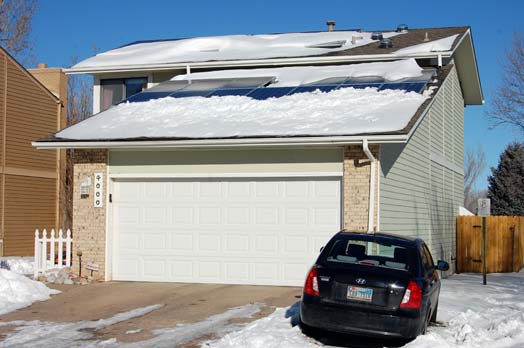
 Ho, ho – hum.
Ho, ho – hum.
Big pre-Christmas snowstorm. Twelve inches of white powdery snow. Then, three straight cloudless, sunny, perfect-for-solar days. And not a single kWh of production from our 5.59 kW home solar system here in Aurora, Colo.
By the end of today, which promises to be extremely sunny – though it won’t be completely cloud-free, as the previous three days have been – we’ll have lost somewhere between 80 and 100 kWh of solar production to snow cover.
{module 419}
This despite the fact that I shoved much of the snow off of our lower 13-panel string – we have two 13-panel stings – with a Mr. Longarm three days ago.
100 kWh = about 350 miles of driving in a Nissan LEAF, or about one-third of our average monthly electricity use (we do not have an electric car yet).
Lack of awareness
Having written a dozen times about solar production lost due to snow cover, I realize I’m starting to sound like a broken record. However, I’m going to keep writing about snow on solar panels until I see some acknowledgment within the solar industry that snow covering solar panels is a real problem, one that significantly reduces solar kWh produced in North America and other parts of the world.
Yeah, I know, you’re probably saying, ‘It’s no big deal.’
My answer is a dirty, four-letter word: C-O-A-L.
Many of those solar kWh lost due to snow cover are being replaced by the burning of coal, including about 70 kWh of the 100 kWh we’ve lost to snow.
And it’s not just our system that’s being dragged down by snow cover preventing production for days and days in perfect-for-solar blue-sky conditions.
Snow covers 100 kW installation
Incredibly, here in the Greater Denver area much, much larger solar installations have been sitting under snow for three straight sunny days. In fact, by the end of today, they will have sat, snow-covered for four straight sunny days — I think by sunny day No. 5, coming tomorrow, the snow will probably have finally melted sufficiently off most local solar installations to allow normal production.
Yesterday, on a wonderful, cool, 100-percent blue-sky, cloudless day, we drove by the University of Colorado-Boulder’s new 100 kW solar carport installation on the east side of U.S. Route 36 on the way to my brother’s house for a Christmas Day celebration.
Just by looking at the still considerable amount of snow on it, I knew for certain that this 100 kW system hadn’t produced a single kWh of solar electricity for three straight, blue-sky days. This means something like 1,700 kWh of solar electricity production lost to snow cover.
It was almost 100 percent snow-covered!
Just by looking at the still considerable amount of snow on it, I knew for certain that this 100 kW system hadn’t produced a single kWh of solar electricity for three straight, blue-sky days. This means something like 1,700 kWh of solar electricity production lost to snow cover.
That’s close to half a year’s electricity use for us in our energy efficient, one might even say energy miserly household. It’s also about 6,000 miles worth of driving in an all-electric Nissan LEAF.
Lots of snow-covered solar panels
And keep in mind CU-Boulder’s 100 kW system represents just a tiny part of the snow-covered solar system picture here on Colorado’s Front Range.
Yes, indeed, there’s a tremendous amount of solar electricity going to waste here in Colorado. Yet, sadly, no one seems to care – except yours truly.
And I’m guessing I’m likely to continue to be brushed off by a dismissive ‘it’ll slide off/melt off eventually’ attitude for a long time to come.
Underneath this attitude lies our addiction to coal, an addiction which continues to reduce solar produced electricity to mere icing-on-the-cake. How else to explain the near complete lack of attention to the snow-on-solar panels issue, one that in the case of CU-Boulder’s 100 kW solar carport installation – which, by the way, is far more accessible to sweeping than much of our rooftop system – easily could have been brushed free of snow four, blue-sky, sunny days ago.
Related articles–>


